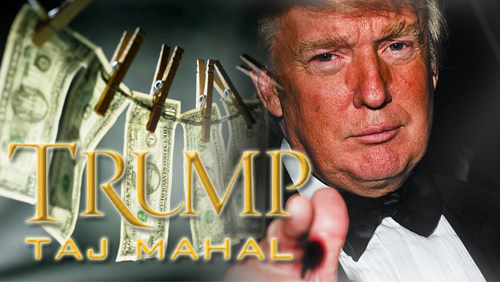Investor Carl Icahn has reached an agreement with Donald Trump on Monday to allow Trump’s name to remain on the Taj Mahal casino in Atlantic City.
 Under the agreement, which needs approval from U.S. Bankruptcy Court in Delaware, Trump Entertainment Resorts will pay Trump $172,000 to satisfy a ground lease claim, among other things.
Under the agreement, which needs approval from U.S. Bankruptcy Court in Delaware, Trump Entertainment Resorts will pay Trump $172,000 to satisfy a ground lease claim, among other things.
“The Trump Taj Mahal, under the right leadership and with the proposed significant reinvestment in the property, can be, once again, a wonderful place for travel and entertainment,” Trump said in a statement.
The agreement also requires Trump Entertainment to remove “any and all vestiges” of the name from the now-closed Trump Plaza casino, where the sign was removed but the name is still outlined in dirt or rust in many areas.
Trump and his daughter Ivanka Trump had sued Trump Entertainment to strip their surname from the two Atlantic City casinos, the depressing state of which they claimed was damaging the Trump brand. The casino owner agreed to strip the name from Trump Plaza, which closed in September, but fought to keep it at the Taj Mahal Casino.
Ivanka Trump said that according to the settlement, the company retains its rights to monitor the Taj Mahal hotel to make sure it’s brought up to their standards and if the casino stops operating for more than 90 days, Trump can decide to have his name taken off the Taj casino, too.
Trump Taj Mahal fined over anti-money laundering violations
The US Financial Crimes Enforcement Network (FinCEN) issued a $10m civil money penalty against Trump Taj Mahal for willful and repeated Bank Secrecy Act (BSA) violations in anti-money laundering (AML) program requirements, reporting obligations, and record-keeping requirements.
FinCEN said that prior to current violations; Trump Taj Mahal had a long BSA’s violations history in 2003 and was penalized $477,700 in 1998 for currency transaction reporting violations.
“Trump Taj Mahal received many warnings about its deficiencies,” said FinCEN Director Jennifer Shasky Calvery. “Like all casinos in this country, Trump Taj Mahal has a duty to help protect our financial system from being exploited by criminals, terrorists, and other bad actors.
“Far from meeting these expectations, poor compliance practices, over many years, left the casino and our financial system unacceptably exposed,” Calvery added.
Aside from the paying the penalty, the casino is also required to conduct periodic external audits to examine its anti-money laundering (AML) BSA compliance program and provide those audit reports to FinCEN and the casino’s board of directors.